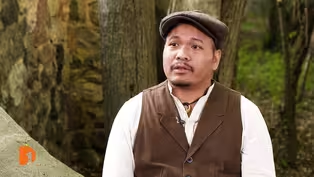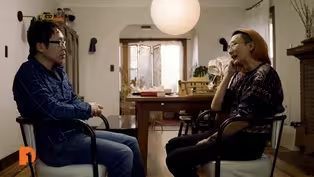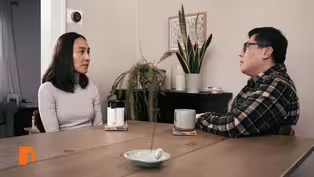
Two women bond through AAPI advocacy, APA Studies Class
Clip: Season 8 Episode 46 | 7m 43sVideo has Closed Captions
Two women create a lasting bond through AAPI Advocacy and an APA Studies class at MSU.
Friends Brenda Hu and Meaghan Kozar participate in One Detroit’s AAPI Stories Series, which tells stories that reflect the authentic lives of Asian Americans in Metro Detroit. They talk about how a pivotal introductory Asian Pacific American (APA)studies class Kozar taught at Michigan State University changed Hu's life.
Problems playing video? | Closed Captioning Feedback
Problems playing video? | Closed Captioning Feedback
One Detroit is a local public television program presented by Detroit PBS

Two women bond through AAPI advocacy, APA Studies Class
Clip: Season 8 Episode 46 | 7m 43sVideo has Closed Captions
Friends Brenda Hu and Meaghan Kozar participate in One Detroit’s AAPI Stories Series, which tells stories that reflect the authentic lives of Asian Americans in Metro Detroit. They talk about how a pivotal introductory Asian Pacific American (APA)studies class Kozar taught at Michigan State University changed Hu's life.
Problems playing video? | Closed Captioning Feedback
How to Watch One Detroit
One Detroit is available to stream on pbs.org and the free PBS App, available on iPhone, Apple TV, Android TV, Android smartphones, Amazon Fire TV, Amazon Fire Tablet, Roku, Samsung Smart TV, and Vizio.
Providing Support for PBS.org
Learn Moreabout PBS online sponsorship(serene music) - Yeah, I don't know if you see this right here.
I don't know if we can do this.
- Ooh!
- [Meaghan] So this will bring back memories.
- "We must be the change we wish to see."
- [Meaghan] What was it?
2013?
Is it 2012 to '13?
- 2013 to 2014 it says.
- So how did you take that class?
It was SSC 293.
It was a social science class.
Intro to Asian Pacific American Studies.
- [Brenda] Rolls right off the tongue.
- Yeah, 'cause I think you took it as a senior.
- Yeah.
- So do you remember why you took that class?
- I think I heard about the Asian Pacific American Studies program through you and a few other of my friends.
While I was in college, I had a sorority sister.
She signed up for Asian Studies at Michigan State University because she wanted to learn more about her heritage and her identity, her background, her history.
She was born here, raised here, but it ended up being all about Asia overseas, and she was learning about China overseas and their practices there, which is great and that's fine, but she couldn't relate to it because she was like, "I don't know, I wasn't born there.
"I haven't been there in a long time."
And then that's when I had learned about the Asian Pacific American Studies program, and when I first took that class, I don't know if you remember this, Meaghan, but it just, everyone that ends up taking that class just gets so fired up and excited because for the first time in their educational academic careers, they're actually learning about their people and what it was like, right?
- Yeah, so I love it.
It used to be a one credit class.
I think when you took it, it might've been a three credit class I think.
People would not necessarily want to take the class because they didn't feel it was relevant or urgent or, you know, what is Asian American studies?
And so I would always love that challenge of them taking it just because they needed a credit, and then it being kind of this, "Oh my gosh, I didn't know what happened."
It's this, like, life changing moment.
And I really, really relish in that.
I love that.
I love that feeling of being able to open their eyes and wake them up to the injustices, that the perceived Asian Americans didn't have any issues or challenges.
- I brought this because I thought it'd be fun to see what's in it after all these years.
I have it written here.
2015 Brenda wrote, "European culture created the idea of Chinese."
Like even back then, we didn't get to be who we were.
We were being defined by European culture and what they wanted us to be and how they saw us, you know?
Do you remember that lesson about Martin Luther King?
- [Meaghan] Yes.
- And the Selma March in Alabama, I believe it was?
- Yeah, so it's this idea of these historical moments that shape the US and that civil rights, these kind of life changing moments of protests or resistance, and oftentimes Asian Americans are left out of those histories, right?
So the example of MLK and his march to Selma, he is shown with these leis around his neck.
We forget that while Asian Americans were not visibly there, and they were there, but oftentimes there's a snapshot of history that's distorted or very limited.
And it's just that example is that history of how Asian Americans supported Martin Luther King through the simple imagery of the leis.
We don't really talk about that or we leave that absent from our conversations of history.
- Yeah, Meaghan, such a good point, and I think that's why advocacy and activism and policy are so important because imagine if I had learned about that when I was 14, sitting in US history class.
I remember seeing that photo in my history book, and I had no idea where those leis came from until 10 years later when I went to college, and that was the first time ever in my life that I learned about my history and how we as Asian Americans were present, but we're just being omitted.
Imagine all of the children, regardless of their ethnicity who could learn about these histories that have just been invisible and not spoken about.
Because I recognize this.
Oh, wow!
And look!
- [Meaghan] There you are!
- [Brenda] Oh, baby Brenda.
- [Meaghan] That was a decade ago.
- [Brenda] Wow.
I do not recognize myself.
- And this was an amazing campaign, and it was a response to the hate and racism toward Asians in particular on Twitter, but then there were so many things happening in the hall, in the dorms across campus.
The idea of the APA studies class is to empower students.
It's about, you are, this is not you're learning about something else.
You're learning about yourself, about your history, about your culture, about your traditions within the US.
That doesn't mean that you can't celebrate your ethnic cultural traditions, right?
So you can embrace being Vietnamese and Chinese, right?
But your experiences within the US intersects with so many communities of color.
It's very US specific, right?
You have your likes, your hobbies, that influences popular culture, but we often don't talk about that, right?
It's when we talk about Asian Americans, it's Asians in Asia.
In Asia, it's you're Vietnamese or you're Filipino or whatever, right?
So the idea of the US I think it's also exciting, too, is that regardless of your specific ethnicity and your culture and traditions, we share this identity of activism, of resistance, of fighting back.
So that goes back to your view of us being viewed as submissive.
We have consistently fought back, resisted, but we aren't taught that, so that's what is key into the foundation of why APA studies or ethnic studies programs are important, to tell that whole story, not a distorted history.
And it's often students who have the privilege of going to college get that opportunity, right?
And it's like, it's an extra.
It's not part of it.
It's like, "Oh, you happen to come across it."
Since I've been here.
Like 15 years.
Yeah, but maybe this is, it's calling, you know?
Well, all the things that are happening now, maybe it's calling for us to revisit and do something like this in a united way.
- [Brenda] Isn't that crazy?
11 years later.
You think more would change, but not much, huh?
Dan Moen on growing up as a Filipino adoptee in Romeo
Video has Closed Captions
Clip: S8 Ep46 | 4m 11s | Dan Moen, an adoptee from the Philippines, shares his experience growing up in Romeo. (4m 11s)
Jack Cheng and Paul Pham unpack what home really means
Video has Closed Captions
Clip: S8 Ep46 | 3m 54s | Asian American friends Jack Cheng and Paul Pham share the common threads that connect them. (3m 54s)
Kyunghee Kim & Leo Chen’s shifting Asian American identities
Video has Closed Captions
Clip: S8 Ep46 | 5m 43s | Kyunghee Kim and Leo Chen have a conversation for One Detroit’s AAPI Stories Series. (5m 43s)
Providing Support for PBS.org
Learn Moreabout PBS online sponsorship
- News and Public Affairs

Top journalists deliver compelling original analysis of the hour's headlines.

- News and Public Affairs

FRONTLINE is investigative journalism that questions, explains and changes our world.












Support for PBS provided by:
One Detroit is a local public television program presented by Detroit PBS


